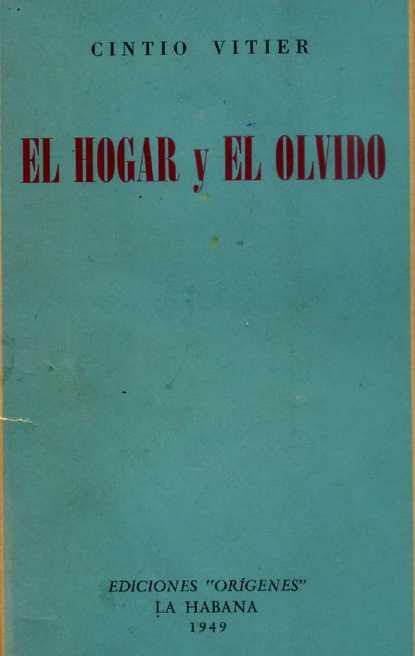4.1.2.9.5 The poetry collection “El hogar y el olvido”, published by Cintio Vitier (1921 – 2009) in 1949

“Home and Forgetfulness,” by Cintio Vitier; although it dates from the period 1945–1950, it possesses a core of significance that merits its independent approach. The text is divided into five sections (some containing a single poem), the opening poems of which are titled: “Treasure,” “The Orange Tree,” “Large Beaches,” “Prelude,” and “The Return.”
The first poem of the text alludes to the passage of time and to escape, from a hermeticism that has encapsulated the underlying symbolism but where an evasive nostalgia is appreciated, perhaps with roots in reality, a coast that could be from this Island but that is immediately shown to be “devoured by snow” has a dispersed referent, the embodiment of oblivion as an atmosphere:
“He comes to make the bed, and flees.
The stone is passing through the night while
run away
sure of the terror that accompanies him like a
motionless stone.
Behind the wall is his soul, and his lost lion
that when looking is rough and pure; he names like a
sage,
like a child on a snow-covered shore,
and sings,
safe from his bed, from the stone…”
This collection of poems vindicates the poet’s connection with his natural surroundings: the orange tree, the seagulls, the reality that bursts into his patio or his doorway, all come together as anchors for a lyricism that has temporarily abandoned its transcendent desire to immerse itself in the truth that surrounds it and whose beauty cannot be reduced to words.
In several of the texts the poet alludes to voluptuousness as a form of relationship with the world, lost in the twists and turns of boredom, a feeling that also somehow permeates the poem, sometimes latent in forms that extend from free verse to a style of poetic prose that is like a litany of life, the poet’s alienated passing.
The emptiness of reality and the already mentioned inadequacy of words also burst into this collection of poems; death and nothingness are outlined on more than one occasion, extending to the realm of language a dissatisfaction with what exists that surely has its political reading:
“How to start, I forget, if the bird hasn’t started?
Break the silent texts of the breeze,
the snow of the night when the naked body
it escapes him
and another fabric dawns resonating on another beach!
How to name life with smoke,
the blood with the empty calm of the vast warehouses
or with the pink humidity that was the night of light?”








